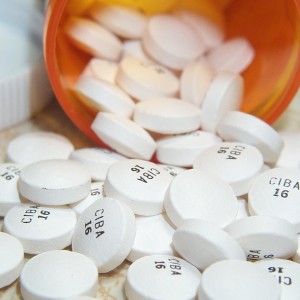by Susan M. Brown, D.C. – ICPA.org:
I happened to be watching television the other day and, instead of my usual flipping channels during commercials, I left it on the channel and saw a few interesting commercials. The first commercial showed a parent heading off a potential drug problem with their child. It had a slogan: “Parents – the anti-drug”. It was a nice public service kind of commercial and hopefully one that people will take to heart. Interestingly, the next commercial showed a parent with their child too but in this commercial instead of the parent trying to keep their child off drugs, they were giving them a drug. The child had a cold with a sore throat and couldn’t sleep. So this angelic figure of a mom was saving them from misery by giving them an over counter medicine, which if you look at the ingredients, amounts to sugar and alcohol with a little dye and artificial flavoring in it (none of which help the child to heal whatever is going on). Within the next hour I saw about a dozen more commercials for one drug after another. There were drugs for depression, headaches, low libido, indigestion, and a whole slew of other ailments. There were even commercials that never said what the drug was for but had lively music and showed scenes of very happy people and simply said to contact your physician to see if it was right for you. The extensive list of side effects for all these drugs, many of which were worse than the ailment the drug was being taken for, was of course, tagged at the end spoken very quickly and very quietly…
I have to wonder, where is the real drug problem? How do we expect our kids to “just say no” to drugs with the media portraying drugs as being the great panacea and when many adults are on several prescriptions as well as giving their kids drugs to avoid any type of discomfort? There seems to be such an incredible double standard. You can take these drugs because the “authorities” say they are OK but not these drugs they say are not. The “good drugs” may be just as addictive and have as many or more side effects as the “bad drugs” but that’s OK because with a prescription they then have the magic stamp of approval. It’s OK for this person who is depressed to take Prozac to give them a boost and make them feel artificially OK whenever the world gets to be too much but the drug addict who is most likely experiencing more emotional/mental pain than the average person could imagine is wrong for doing essentially the same thing. Kids grow up having their parents or doctors give them various drugs for the slightest discomfort, drugs that are not intended to strengthen their bodies and help them to heal, but to cover up the symptom, which ultimately weakens the body. Then we wonder why as the kids get older and feel whatever angst they experience in their lives and need a little “pick me up” they go to drugs or alcohol. Maybe it’s because that is what they learned you do when you feel uncomfortable. You “take something” to make the pain go away so you can supposedly feel better. They didn’t learn to see the discomfort as a message from the body asking to make a change or telling you that it was working hard to heal something so please do healthy things. They didn’t learn that discomfort is uncomfortable but not life threatening and that the body given time will heal most things and become stronger in the process. They didn’t learn that the peaks and valleys are part of life and can make it fuller if you learn to flow with it and approach it like a roller coaster ride, sometimes scary and sometimes a blast. They learned that if you are uncomfortable, take a drug to make it better. My body is not capable of healing so I need a drug to do it for me.
Now don’t get me wrong, I’m not completely against medicine nor do I think that people should never take drugs. I just think that we tend to live in a pill popping society where many seem to think that drugs will make it all better. And bottom line, drugs don’t make it all better. Most of them simply allow one to function in spite of whatever is really going on. I’m reminded of a person I saw when I was first in practice, we’ll call him Max. When Max first came in I saw from his history that he was on several medications. I asked him why so many? He gave me a very typical story that he started on one and then started having other symptoms (actually side effects from the first drug) and so was given an additional drug and then started having more symptoms (more side effects) and was given another drug and so on and so on. Ultimately he was on about 10 different medications, about a third of them for the depression and the rest for various side effects including insomnia, indigestion, pain, constipation, and anxiety. Now keep in mind that the researchers test the effect of one drug on the body and there has been some research that has tested the effects of two drugs in combination on the body, but they have no idea what the overall effect of 10 drugs in combination on the body will be. I’d like to say that Max is an exception, but that wouldn’t be true. Many people are on multiple medications and it is standard care in medicine. The other noteworthy thing on Max’s history was his reason for being in my office. He said he came in because he was uncomfortable all the time and was told I might be able to help. I asked him in what way was he uncomfortable. Instead of what I expected, which was the common “chiropractic complaints” of my back hurts or my neck hurts, he began to tell me about his life. He hated his job as a social worker in which he saw an endless line of people who he described as having the most heart wrenching lives in the world many of whom he could not really help within the system. He was unhappy in his marriage and had been for many years. His wife belittled him constantly and his children had started doing the same, but this was no different than his childhood in which his parents had done it too. He had no hobbies that brought him joy. Any friends that he had were long gone and the only socializing he did was with his wife’s family who made no bones about expressing their belief that his wife had married a loser. I asked if all this had started before he started taking the medication and he said yes that it had been going on for years before. Then I simply said, “Max no wonder you’re depressed. If I had your life I would be depressed too.” He looked at me first with confusion and then with recognition as if a light had gone on for the first time and he started to laugh. The next words out of his mouth were, “You’re right my life sucks.” To make a very long story short, Max started getting adjusted and making changes in his life. He asked his doctor to begin to wean him off all medication, got a new job and was much less depressed. He found a hobby and had little glimpses of enjoying life. I’d like to say that his path to healing was effortless but it wasn’t, it was hard work and required that he begin to looked at himself and his life honestly. He had times when he felt he needed to take an antidepressant but it was to support him through a time of great change while he was on the road to healing his life. It was a short term choice for support and not a long term choice for denial. He realized that the depression he was experiencing wasn’t something that was wrong with him but something that was very right with him. It was a cry from the core of his being saying “I deserve something more in life. I deserve to be happy and to be loved and to enjoy life. I can’t tolerate a life that does not nourish me.”
Max made a choice to heal. Often people make a choice not to heal, but to feel better. Now don’t get me wrong, I love feeling great. I love it when it is an expression of my state of being and not an artificial feeling created by artificial means to hide what is really going on. On some level my body knows what is really going on. And it will continue to give me stronger and stronger signals until I pay attention. So, I can either keep taking more and more drugs or I can pay attention to those “uncomfortable” signals and consider what needs to change. We have to ask the question, is it reasonable to expect that our kids will choose to say no to drugs when most of society doesn’t? Is it reasonable to expect that they will have the tools to heal and integrate the many uncomfortable experiences they may have in life if we as parents never gave them those tools? You may be thinking “but I only give them cough medicine and maybe some antibiotics when they are sick” and “I really need that Prozac or those beers to get me through those stressful days”. Where do we draw the line? Most cough medicine has alcohol to make them drowsy and sugar to coat the throat. It is definitely more comfortable for the child and the parent because the child will often sleep, as most people want to do with a little alcohol in their system, but the sugar coating the throat is perfect food for the bacteria their body is trying to battle, the cough suppressant is inhibiting their bodies from getting rid of the debris, mucous, and bacteria in their lungs, the aspirin is decreasing their fever, which the body needs to fight infection and stimulate the immune system, and the antibiotics weaken the immune system. Most diseases are self limiting and most cold/flu ailments last for about a week regardless of the treatment sought. So, in most cases, why not do things to strengthen the body while it is working to heal. Learn the natural ways to strengthen the body and become an informed consumer for your health and the health of those you love. If you are depressed, distressed, and generally stressed why not consider the reasons why. Learn tools that help you to heal and pass that on to your kids instead of “here take this”. In order for parents to “be the antidrug” we have to provide kids with options and role models for what it means to be drug free. We need to give them tools so they don’t feel the need nor the desire for them. If we do this will it guarantee that our child will never take drugs? Unfortunately, no, but if they do we can know that we gave them the best foundation possible and that at least we were consistent in the message we gave. We can know that we were conscious of the choices we made and did all we could to listen, love, and learn and pass that on to our children.
Article originally posted at ICPA.org.
